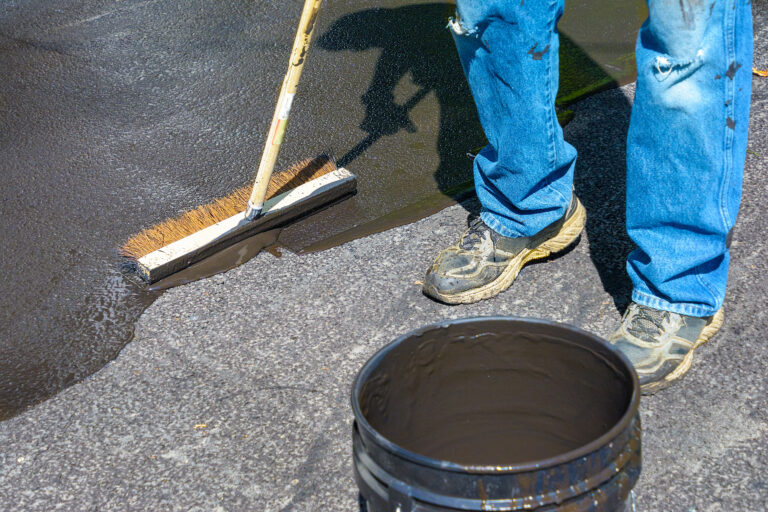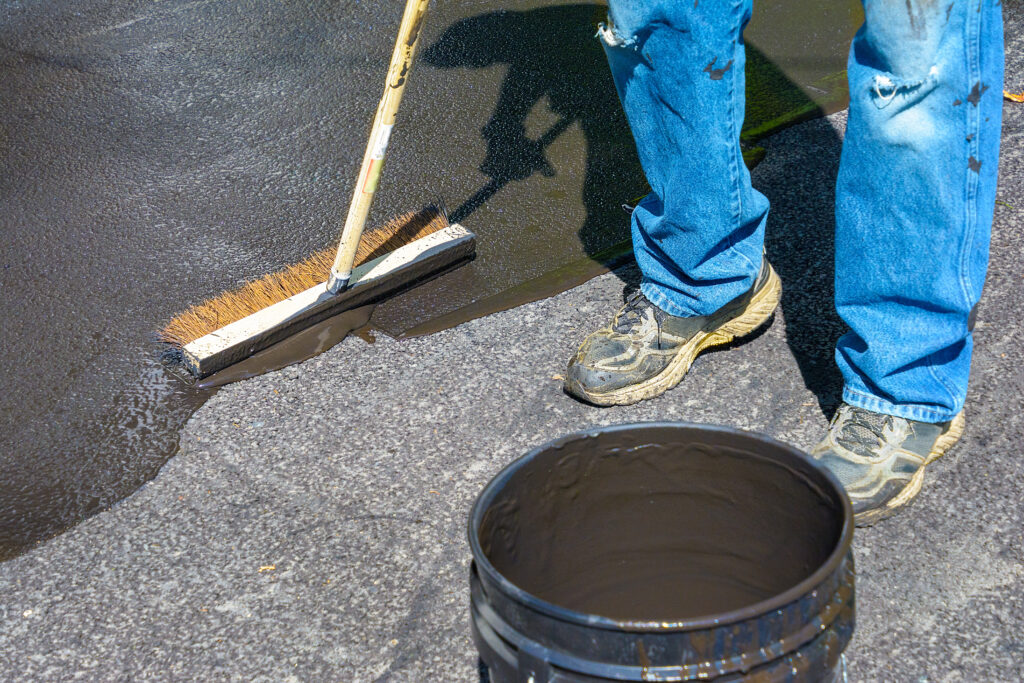Menu
close

Table of Contents
Concrete driveways are no longer the drab, dull grey slabs we associate with times past. These days, they offer an attractive and cost-effective alternative to block paving and asphalt, especially when they are needed to cover large areas. You can have a concrete driveway laid in a range of colours and imprinted with different textures, making your driveway unique, adding value and appeal to your home.
However, one question that often arises is whether you need to use a concrete sealer. Anyone who's had a concrete driveway installed, or is considering it, may have been advised that this is essential, so is it really necessary, or is this just an attempt by the driveway specialists to make more money?
Read on to find out! This unbiased guide tells you all you need to know.
A new concrete driveway should easily last 25-30 years without concrete sealing, as long as it has regular maintenance. This involves sweeping away any debris and washing it down once in a while.
Concrete is a tough and durable building material, as long as they are laid properly and allowed to cure. It is vitally important to use a concrete contractor or professional driveway specialist. They will ensure that the ground is prepared, the mixture is right, and that the concrete slab is poured correctly to avoid cracks and to keep it stable.
So, a professionally mixed and poured concrete driveway will last a good long time without being sealed.
However, bare concrete surfaces are porous, allowing moisture into the structure. This means that the surface can become stained, especially if your car leaks oil, and these stains can be difficult to shift if they're not cleaned up immediately. Oil stains can be dangerously slippery, potentially causing accidents and injury.
Aside from oil, a concrete driveway can be damaged or stained by things like fertilizer, leaves, pet urine, dirt, tire tracks, and so on. Rock salt that's spread on the roads in the UK in winter can be bad news for concrete, as it absorbs water. The resulting solution will soak into the concrete, where the hydraulic pressure may exceed the compression strength of the concrete, causing hairline cracks.
A poorly-laid concrete slab can also crack, especially if the ground was not properly prepared. Moisture can penetrate the porous surface, which freezes when the temperature drops in winter, causing cracks and flakes in the concrete surface. Frost heave can be problematic, too. This happens when water in the ground surface beneath the slab freezes, pushing the concrete upwards. When this thaws it leaves a void, causing the concrete driveway to sag, which allows water to gather in pools. Over time, this may result in major cracks.
Efflorescence can occur, too, caused by water-soluble salts that float to the top. This shows itself as a white, powdery residue that spoils the look of your concrete driveway.
One way to guard against all of these problems is to have a sealed concrete driveway.
Basically, they are divided into two types of concrete sealers: penetrating sealers and film-formers.
Whichever one you choose, it should always be a good quality sealer.
But what's the difference between film-forming and penetrating sealers? Let's take a look:
Also called impregnating sealers, these prevent damage and stains by keeping the moisture on the surface and not allowing it to enter the concrete matrix. Organic materials, such as dirt, water, oil, salt, etc. can't make their way into the concrete, but the sealer still allows the concrete to breathe.
They do this through a chemical reaction that happens just below the surface, which drastically limits the chances of foreign matter getting in.
The problems we noted above (Staining, freeze/thaw damage, efflorescence, etc.) are all caused by the absorption of liquid molecules. A penetrating sealer stops this, leaving your concrete driveway looking fresh, and with a non-skid surface.
These create a protective film that reduces damage from wear and tear and protects the concrete from moisture. They provide an attractive and stain-resistant gloss finish that enhances and deepens the colour, making it much easier to maintain.
However, as they alter the properties of the concrete surface, they can sometimes become slippery when wet.
Within these two types, there are several different chemical compositions. Many years ago there was a limited choice, but these days you can have water-based acrylic resin based sealer and polyurethane sealer, as well as solvent based products.

Applying a sealer to concrete makes it last longer as it is able to repel moisture, block UV rays, prevent cracks, and keep the colours looking fresh and vibrant for many years.
Maintaining the sealed concrete is very easy, requiring a quick sweep to get rid of dirt and leaves, and a pressure wash every now and then will make it look like new.
A sealed concrete driveway is less likely to stain as oil and other liquids are unable to find a way in.
As we have learned, there are many benefits to concrete driveway sealing, but does this make it a good idea?
We've seen the pros, so let's take a moment to look at the cons of sealing:
It adds to the overall cost of the project, and will need reapplying every few years to remain effective as they begin to fade, especially in frequently used areas.
It provides limited wear resistance.
Most sealers are solvent-based and require safety gear to be worn, as they contain harsh chemicals that are dangerous to humans and animals if touched or inhaled. Safer sealers are available, but these environmentally friendly alternatives are more expensive.
Some sealers provide a seamless layer that can become slippery in wet conditions.
Concrete sealer can't be used on new slabs, and you must allow at least a month to cure before applying. While the driveway concrete is curing it will be vulnerable to damage.
Some of these can be overcome, for example, you can include a fine abrasive in the sealer to provide traction, reducing the chances of slipping.

There are several steps involved, and many homeowners feel able to tackle the job themselves. However, it is essential that it is done properly otherwise you will ruin your concrete driveway. In some cases, the sealer will need to be stripped and reapplied, adding to the overall cost.
Typically, the job of sealing concrete is as follows:
Although it may look simple, there is an art to the process that requires a skilled hand.
We've examined the pros and cons of sealing concrete, and, as we've seen, concrete driveways perform well enough without applying sealer. Of course, concrete slabs will last longer if they are professionally installed and allowed to cure for an adequate amount of time. It is absolutely essential to use a qualified, professional driveway specialist to install a concrete driveway if you want the best results.
Modern driveway concrete is superior to the material used in the past, in terms of its composition as well as its appearance. The addition of coloured pigments and a wide range of textures makes concrete driveways an attractive option for many homeowners, improving the appeal of the property and adding to its value.
However, having paid for a new concrete driveway, the additional cost of applying a sealer could be a good investment. But this will be a continuous process, as the sealers themselves will only last for between 6 months and three years before they need reapplying. In general, solvent-based sealers last much longer than water-based examples.
So, what's the verdict? There are definite pros and cons of sealing concrete driveway installations, but the final decision comes down to how much you are prepared to invest in your property to keep it looking good.
In the end, concrete driveway sealing isn't essential, but it is advisable, especially for coloured or decorative installations.